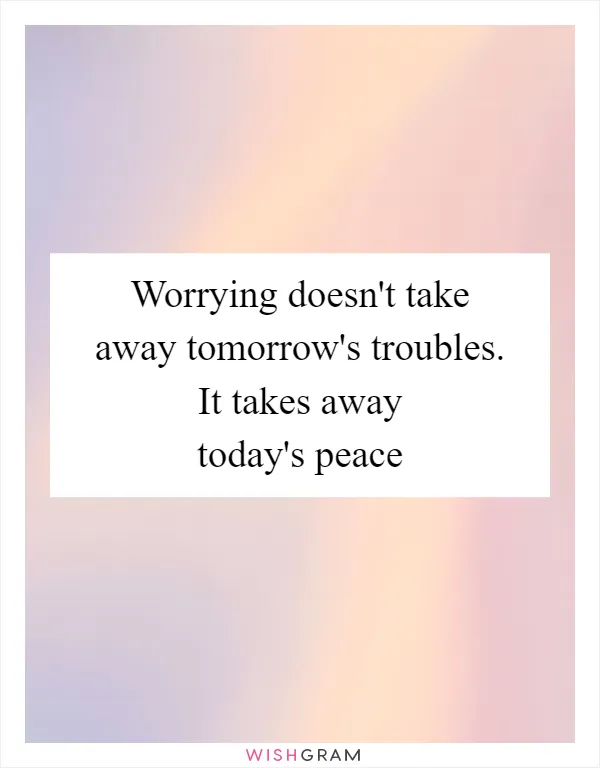Worrying doesn't take away tomorrow's troubles. It takes away today's peace
Worrying is a natural human response to uncertainty and challenges. It is a way for our minds to try and anticipate and prepare for potential problems or difficulties that may lie ahead. However, it is important to recognize that worrying excessively can have detrimental effects on our mental and emotional well-being. As the saying goes, "Worrying doesn't take away tomorrow's troubles. It takes away today's peace."
When we constantly worry about the future, we are essentially robbing ourselves of the present moment. We become so consumed by what might happen that we fail to fully experience and appreciate the beauty and opportunities that surround us right now. Our minds become preoccupied with negative thoughts and worst-case scenarios, leaving little room for joy, gratitude, and contentment.
Moreover, worrying often leads to a cycle of anxiety and stress. The more we worry, the more anxious we become, and the more anxious we become, the more we worry. This vicious cycle can have a significant impact on our physical health, as well as our relationships and overall quality of life. It can drain our energy, impair our decision-making abilities, and hinder our ability to enjoy the present moment.
Instead of allowing worry to consume us, it is important to cultivate a mindset of acceptance and resilience. We must learn to acknowledge that uncertainty is a natural part of life and that we cannot control everything that happens to us. By accepting this reality, we can free ourselves from the burden of constant worry and focus on what we can control – our thoughts, actions, and attitudes.
One effective strategy to combat worry is to practice mindfulness. Mindfulness involves being fully present in the moment, without judgment or attachment to thoughts or emotions. By practicing mindfulness, we can train our minds to let go of worries about the future and instead focus on the present moment. This can help us find peace and tranquility amidst the chaos and uncertainty of life.
Another helpful approach is to challenge our worries by asking ourselves if they are based on facts or simply our own fears and assumptions. Often, we catastrophize situations and imagine the worst possible outcomes, even when the likelihood of them occurring is minimal. By questioning the validity of our worries, we can gain a more realistic perspective and alleviate unnecessary anxiety.
Additionally, seeking support from loved ones or professionals can be immensely beneficial when dealing with excessive worry. Talking about our concerns and fears with someone we trust can provide us with a fresh perspective, reassurance, and guidance. Sometimes, simply sharing our worries can help us gain a sense of relief and perspective.


